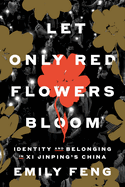
The increasingly repressive nature of the Chinese state against those who do not comport with Xi Jinping's vision of Chinese society is the focus of journalist Emily Feng's absorbing Let Only Red Flowers Bloom. Feng documents the experiences of more than two dozen people whose backgrounds, identities, and professions compose a holistic portrait of life in 21st-century China. Through these affecting stories, Feng reveals the myriad human fronts of resistance to Xi's repression of ethnic and religious minorities. Feng's subjects, who include lawyers, teachers, booksellers, and believers, amplify the chorus that to be safe in China, one must adhere to a specific set of characteristics.
For example, early on in Xi's tenure, a communique known as "Document Nine" proclaimed a singular "Chinese" approach to running a country, "one administered by the [Communist] Party alone." Feng recounts the plight of groups such as the Chinese Hui and the Turkic Uyghurs, who suffer continued persecution for their Islamic faith. As she writes, it is all part of China's efforts "to re-engineer the human soul" through the vague process of "Sinicization" or "becoming Chinese." This process includes suppressing the teaching or speaking of any language other than Mandarin; Feng's portrait of a Mongolian teacher protesting the expulsion of the Mongolian language from school textbooks in Inner Mongolia captures the draconian character of China under Xi. It is a nation that desires only one kind of flower in its garden: the red kind. Let Only Red Flowers Bloom is a fearless work of reportage that reveals the alarming array of attacks against diversity, freedom, and identity in Xi's China. --Peggy Kurkowski, book reviewer and copywriter in Denver

